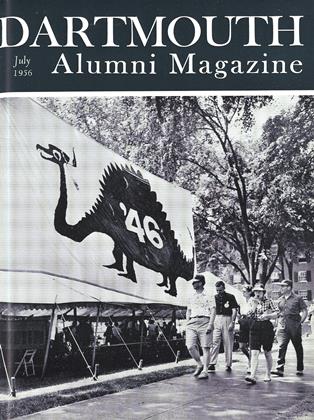(Dartmouth's Own Mountainside Retreat)
Back in 1938, with the help of alumni funds, students, and workers from Warren, Ross McKenney built the Moosilauke Ravine Lodge in Jobildunc Ravine on Mount Moosilauke from huge spruce logs cut in the ravine. With the burning of the old Moosilauke Summit Camp in 1942, the Ravine Lodge became Dartmouth's main facility in the Moosilauke area, although it remained closed until the end of the war. Since then it has been operating as a mountain inn, owned by Dartmouth College, and serving camp groups, outing club groups, and individuals who stop by.
The Ravine Lodge particularly wants you, as members and friends of the Dartmouth family, to use its facilities when you're in the White Mountains. You are especially welcome, both in the hospitality we will offer you, and by reduced rates for you and your family. We hope you'll stop in for a meal, an overnight, or just to say "hello" while you're driving through the White Mountains this summer.
The Ravine Lodge is managed and run by a Dartmouth undergraduate crew (just to make the Dartmouth atmosphere complete). Meals are served family style, cooked to perfection by John Hobbie, '57, veteran of four years with the Appalachian Mountain Club huts. Rates for alumni and their families for three meals and lodging run from $4.50 per person. The Ravine Lodge is just off Route 118 near Warren, N. H. We hope to see you there!
For reservations, write:
BRAD LEONARD '56, Manager Moosilauke Ravine Lodge Warren, N. H.
Or call: ROckwell 4-2256
Open from June 10 until September 10.
P.S. If you have a son between the age of ten and fourteen, he might be interested in attending our woodcraft camp for boys, Camp Jobildunc, held at the Lodge during the last two weeks of August. It will be a valuable experience for him! For information, write to the Moosilauke Ravine Lodge, Warren, N. H.
Unfortunately, as Dr. Leo Szilard said some years ago: "It appears easier to kill all the people in the world than to kill half of them."
But the atoms have all been weighed in the balances and are being measured against a six-foot standard. This is the only test not yet concluded.
Charles Bolté's book is a brief serious look at the possibility of "universal, total, enforceable Disarmament." It is a short book on a subject which has received some worry, much tub-thumping, and very little thinking.
More advanced studies are to be found in the encyclopedic work of Mr. Grenville Clark and Prof. Louis Sohn - Peace Through Disarmament and Charter Revision, and its "Supplements."
DAVID BRADLEY '38
Himself the author of a best-selling primer on this same general area of concern, Dr. Bradley has presented here a brief statement about the central issue with which Mr. Bolté's book deals.
In The Price of Peace, Mr. Bolté's development of the book's theme progresses from his own basic beliefs about the problem which it treats: (1) "Disarmament is worth pursuing right now, despite the political divisions of the world." (2) "Disarmament is a military necessity and a political imperative, not simply a social desirability or a psychological-welfare gambit." (3) "The present proposals of the United States government are totally inadequate." (4) "A plan can be devised which will secure the peace and make it safe for the United States and other nations to disarm." (5) "The political circumstances in which such a plan could be agreed upon can be foreseen, and to some extent created."
The author points out the perils of the present political and military situation and analyzes critically the current defense policy of the United States, with particular emphasis on our failure to recognize the essential nature of disarmament activity. He traces historically the growth of our present disarmament policy, showing that it has "gone badly off the tracks," and he argues for the need of a specific disarmament plan capable of showing how countries might, without sacrificing their safety, reduce their arms holdings and armies.
Realizing that disarmament alone "is not a panacea for our troubled world," but merely one important facet of the broad problem of peace that faces our civilization, Mr. Bolté does not seek to put forth a set, neatly packaged scheme for adoption. His purpose, rather, is to place before the public a series of hypotheses to be considered and discussed.
E. C. L.
 View Full Issue
View Full Issue
More From This Issue
-
 Feature
FeatureThe Honorary Degree Citations
July 1956 -
 Feature
FeatureThe 1956 Commencement
July 1956 By FRANK PEMBERTON -
 Feature
FeatureThe Fifty-Year Address
July 1956 By THURLOW M. GORDON '06 -
 Feature
FeatureGeorge Nickum '31 to Head Alumni Council for 1956-57
July 1956 -
 Feature
FeatureThe Seniors' Valedictory
July 1956 By WILLIAM FREDERICK BEHRENS '56 -
 Feature
FeatureThree Alumni Honored For Service to College
July 1956







